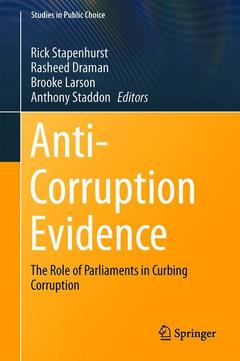Anti-Corruption Evidence, 1st ed. 2020 The Role of Parliaments in Curbing Corruption Studies in Public Choice Series, Vol. 34
Coordonnateurs : Stapenhurst Rick, Draman Rasheed, Larson Brooke, Staddon Anthony

Introduction: Corruption: Its Causes and Consequences.- Chapter 2: Parliament and Corruption: Theory and Research Design.- Chapter 3: Ghana.- Chapter 4: Nigeria.- Chapter 5: Uganda.- Chapter 6: Tanzania.- Chapter 7: Caribbean.- Chapter 8: Myanmar.- Chapter 9: Oversight and Extractive Industries.- Chapter 10: Oversight and Public Procurement (the Case of Zambia).- Chapter 11: Motivation of MPs: Political Will.- Conclusion: Parliament and Corruption: A Synthesis.
Frederick Stapenhurst is an Assistant Professor (Professional) at the School of Continuing Studies. He is the principal investigator for four SSHRC-funded research projects, one examining Public Financial Management in Francophone countries, another setting up a global network of parliamentary budget offices, the third examining the demand and supply side of corruption in the mining/extractive sectors in West Africa and the fourth setting up a global network of parliamentary training institutes.. Under his leadership, McGill University, in collaboration with development partners, has launched a university-certified Internationsal Professional Development Program for Parliamentary Staff and a Program for newly elected MPs from small countries
Presents new research focused on corruption in the face of parliamentary oversight
Analyzes the impact of parliamentary oversight through detailed country studies
Provides practical advice for parliaments and anti-corruption assistance agencies such as the World Bank and DFID
Date de parution : 05-2019
Ouvrage de 214 p.
15.5x23.5 cm
Disponible chez l'éditeur (délai d'approvisionnement : 15 jours).
Prix indicatif 89,66 €
Ajouter au panierThèmes d’Anti-Corruption Evidence :
Mots-clés :
corruption; government oversight; parliament; anti-corruption; mechanisms; Ghana; Nigeria; Myanmar; Tanzania; Uganda; Caribbean



